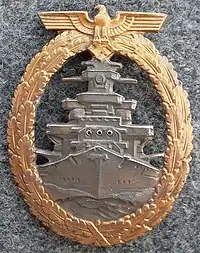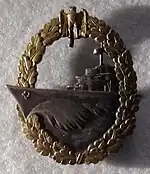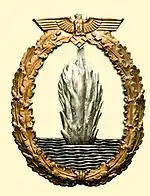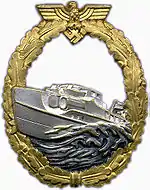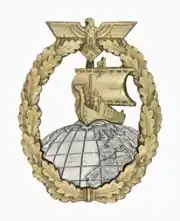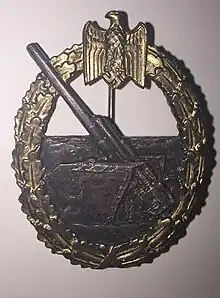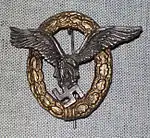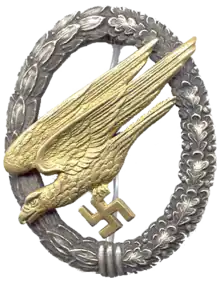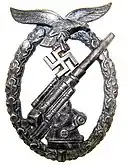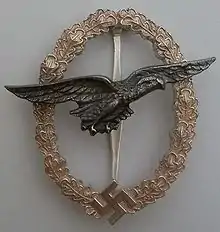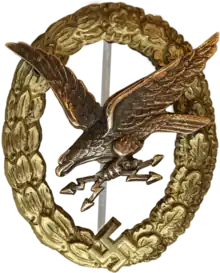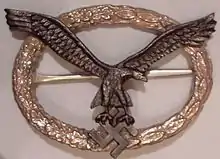Awards and decorations of Nazi Germany were military, political and civilian decorations that were bestowed between 1923 and 1945, first by the Nazi Party and later the state of Nazi Germany.
The first awards began in the 1920s, before the Nazis had come to national power in Germany, with the political decorations worn on Party uniforms, along with any awards they may have earned during the First World War or before.
After 1933, the state began issuing a variety of civilian decorations, which could be bestowed upon any citizen of Germany. Thus, some awards (such as Sports Badges) were bestowed on Nazi Party members, members of the German military, and regular civilians. Many standard awards of the German state, such as life-saving medals, were redesigned to incorporate the Nazi symbol, the swastika.
A number of military awards were established pre-war, including Wehrmacht long service decorations, followed by awards for participation in the Spanish Civil War and for the annexation of Austria and the Sudetenland, with the greatest number established after the start of World War II in 1939. Regulations of award also permitted the simultaneous wear of military, civilian, and political decorations on any military or para-military uniform of Nazi Germany.
Nazi awards and decorations were discontinued after the defeat of Nazi Germany in 1945, with display of the swastika banned. In 1957 the Federal Republic of Germany permitted qualifying veterans to wear many Nazi-era awards in Bundeswehr uniform. including most World War II valor and campaign awards,[1] provided the swastika symbol was removed.[2] This led to the re-design of many awards with, for example, the swastika being replaced by a three-leafed oakleaf cluster on the Iron Cross and by the date 1939 on the War Merit Cross.[3] In addition, new military awards were created for post war service by both the West German and East German governments.
Orders and decorations
State orders
| Badge and ribbon | Name (English/German) | Creation date – cessation date | Description | Number awarded |
 |
Order of the German Eagle Verdienstorden vom Deutschen Adler |
1 May 1937 – 8 May 1945 | Awarded with and without swords. | The number of times the order was awarded is unknown. |
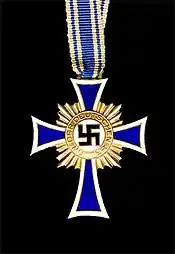 |
Cross of Honour of the German Mother Ehrenkreuz der Deutschen Mutter |
1939 until 1945 | Awarded to exemplary mothers who furnished Germany with Aryan children. Instigated by Hitler and bears his signature on the reverse. Awarded in three levels, Bronze, Silver, and Gold. | The number of times the order was awarded is unknown. It is estimated that up until September 1941 there were a total of 4.7 million recipient mothers. |
War decorations: pre 1939
| Badge and ribbon | Name (English/German) | Creation date – cessation date | Description | Number awarded |
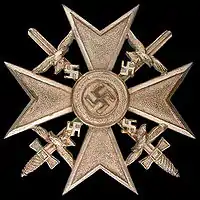 |
Spanish Cross Spanien-Kreuz |
14 April 1939 – 1940 | Awarded with and without swords. Issued in bronze, silver, gold and gold with diamonds. For service with the Condor Legion in Spain. |
26,116 Total, for all classes |
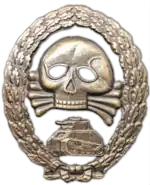 |
Condor Legion Tank Badge Panzertruppenabzeichen der Legion Condor |
September 1936 – autumn 1939 (official decoration 10 July 1939) |
For tank instructors and maintenance personnel who served with the Condor Legion in Spain, 1936–1939. | 415 |
War decorations: 1939–1945
These awards were bestowed by the Wehrmacht and Waffen-SS between 1939 and 1945, during World War II.
| Badge and ribbon | Name (English/German) | Creation date – cessation date | Description | Number awarded |
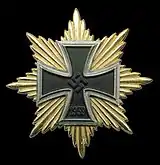 |
Star of the Grand Cross of the Iron Cross Stern zum Großkreuz des Eisernen Kreuzes |
1 September 1939 – 8 May 1945 | A higher class of the Grand Cross of the Iron Cross. A prototype was made, but the decoration was never formally instituted or awarded.[4] | 0 |
.jpg.webp) |
Grand Cross of the Iron Cross Großkreuz des Eisernen Kreuzes |
1 September 1939 – 8 May 1945 | Awarded to victorious Generals/Field Marshals of German forces and her allies. Hermann Göring, received the Grand Cross on 19 July 1940, the only recipient of World War II. |
1 |
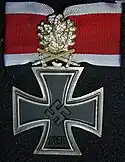 |
Knight's Cross of the Iron Cross with Golden Oak Leaves, Swords and Diamonds Ritterkreuz des Eisernen Kreuzes mit goldenem Eichenlaub, Schwertern und Brillanten |
29 December 1944 – 8 May 1945 | To be awarded after World War II to Germany's 12 greatest war heroes. Actually awarded only once, to Hans-Ulrich Rudel for continuous outstanding achievements and heroism.[5] |
1 |
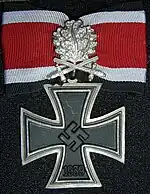 |
Knight's Cross of the Iron Cross with Oak Leaves, Swords and Diamonds Ritterkreuz des Eisernen Kreuzes mit Eichenlaub, Schwertern und Brillanten |
28 September 1941 – 8 May 1945 | For continuous bravery before the enemy or excellence in commanding troops after being awarded all preceding classes of the Knight's Cross/Iron Cross. | 27 |
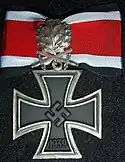 |
Knight's Cross of the Iron Cross with Oak Leaves and Swords Ritterkreuz des Eisernen Kreuzes mit Eichenlaub und Schwertern |
28 September 1941 – 8 May 1945 | For continuous bravery before the enemy or excellence in commanding troops after being awarded all preceding classes of the Knight's Cross/Iron Cross. | 160 (159 German, 1 Japanese)[lower-alpha 1] |
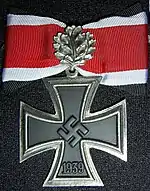 |
Knight's Cross of the Iron Cross with Oak Leaves Ritterkreuz des Eisernen Kreuzes mit Eichenlaub |
3 June 1940 – 8 May 1945 | For continuous bravery before the enemy or excellence in commanding troops after being awarded all preceding classes of the Knight's Cross/Iron Cross. | 890 (882 German, 8 Axis allies) |
.jpg.webp) |
Knight's Cross of the Iron Cross Ritterkreuz des Eisernen Kreuzes |
1 September 1939 – 8 May 1945 | Awarded for outstanding bravery in the face of the enemy and for brilliant service in command of troops. A requirement was the possession of the 1st and 2nd class of the Iron Cross. | 7,318 |
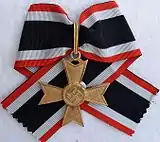 |
Golden Knights Cross of the War Merit Cross Goldenes Ritterkreuz des Kriegsverdienstkreuz |
13 October 1944 – 8 May 1945 | Awarded with and without swords. For outstanding contributions to the war effort. |
2 (Further recommendations not approved by end of war) |
 |
Knights Cross of the War Merit Cross Ritterkreuz des Kriegsverdienstkreuz |
19 August 1940 – 8 May 1945 | Awarded with and without swords. For meritorious contributions to the war effort after being awarded all preceding classes of the War Merit Cross. |
c. 250 |
| German Cross in Gold with Diamonds Kriegsorden des Deutschen Kreuzes in Gold mit Brillanten |
October 1942 – 8 May 1945 | To be awarded for continuous bravery before the enemy or excellence in commanding troops (having already been awarded the German Cross in Gold). No awards were ever made. | 0 | |
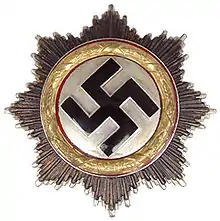 |
German Cross in Gold Kriegsorden des Deutschen Kreuzes in Gold |
28 September 1941 – 8 May 1945 | For continuous bravery before the enemy or excellence in commanding troops (not justifying the Knight's Cross of the Iron Cross but having already been awarded the Iron Cross 1st Class) | 24,204 (24,190 German, 14 Axis allies) |
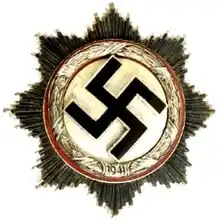 |
German Cross in Silver Kriegsorden des Deutschen Kreuzes in Silber |
28 September 1941 – 8 May 1945 | For significant performances in aiding the military war effort. (Not justifying the Knight's Cross of either the Iron Cross or the War Merit Cross but having already been awarded the Iron Cross 1st Class or War Merit Cross 1st Class) | 1,115 |
.jpg.webp) .jpg.webp) .jpg.webp) |
Honour Roll Clasp Ehrenblattspange |
30 January 1944 – 8 May 1945 | Different designs for the army, navy and air force Awarded to those who appeared on the Honour Roll for distinction in combat. |
4,556 (Army and Waffen-SS awards only)[7] |
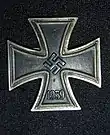 |
Iron Cross (1st Class) Eisernes Kreuz 1. Klasse |
1 September 1939 – 8 May 1945 | For continuous bravery before the enemy or excellence in commanding troops after being awarded the Iron Cross 2nd class. | c. 300,000[8] |
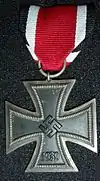 |
Iron Cross (2nd Class) Eisernes Kreuz 2. Klasse |
1 September 1939 – 8 May 1945 | For bravery before the enemy or excellence in commanding troops. | c. 4,500,000[9] |
 |
1939 Clasp to the Iron Cross Spange zum Eisernen Kreuz |
1 September 1939 – 8 May 1945 | An award of the Iron Cross, 1st or 2nd class for those who had already received the decoration in World War I. | 100,000+ |
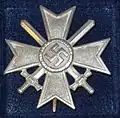 |
War Merit Cross (1st Class) Kriegsverdienstkreuz 1. Klasse |
18 October 1939 – 8 May 1945 | Awarded with and without swords. For meritorious contributions to the war effort after being awarded the War Merit Cross, 2nd class. |
c. 480,000 with swords c. 90,000 without swords[lower-alpha 2] |
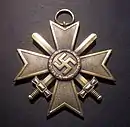 |
War Merit Cross (2nd Class) Kriegsverdienstkreuz 2. Klasse |
18 October 1939 – 8 May 1945 | Awarded with and without swords. For meritorious contributions to the war effort. |
c. 6,100,000 with swords c. 1,500,000 without swords[lower-alpha 2] |
.jpg.webp) |
War Merit Medal Kriegsverdienstmedaille |
19 August 1940 – 8 May 1945 | For lower-level civilian contributions to the war effort. | c. 4,900,000[lower-alpha 2] |
Military service decorations
| Cross of Honor (1914–1918) Ehrenkreuz des Weltkriegs |
Eastern Front Medal Medaille Winterschlacht im Osten |
West Wall Medal[lower-alpha 3] Schutzwall-Ehrenzeichen 1944 bar authorized |
Anschluss Medal | Memel Medal | Sudetenland Medal Prague Castle Bar authorized |
|---|---|---|---|---|---|
 |
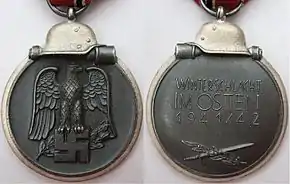 |
 |
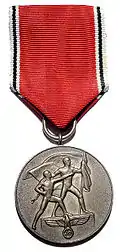 |
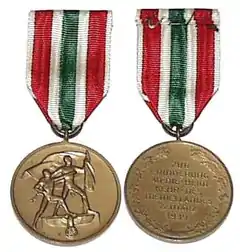 |
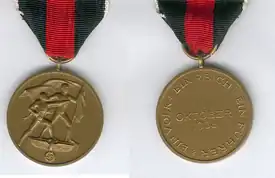 |
Military long service medals
| Wehrmacht Long Service Award Wehrmacht-Dienstauszeichnung Awarded to army, navy, and air force Grades for 4, 8, 15, 25, and 40 Years of Service |
SS Long Service Award SS-Dienstauszeichnungen Grades for 4, 12, 18, and 25 Years of Service |
|---|---|
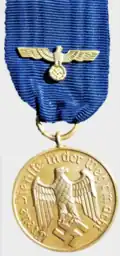 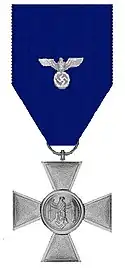 |
 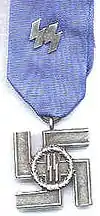 |
Arm shields
| Narvik Shield, 1940 | Crimea Shield, 1941–1942 | Cholm Shield, 1942 | Demyansk Shield, 1942 | Kuban Shield, 1943 | Warsaw Shield, 1944 | Lapland Shield, 1944–1945 |
|---|---|---|---|---|---|---|
.png.webp) |
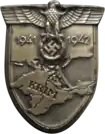 |
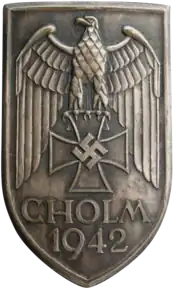 |
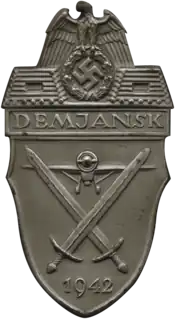 |
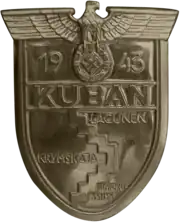 |
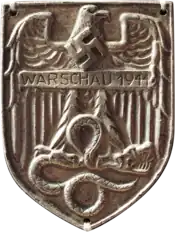 |
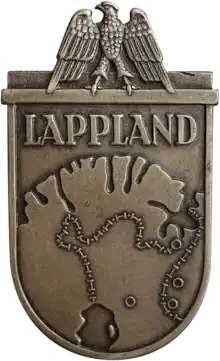 |
Campaign cuff titles
| Crete Cuff Title, 1942 | Africa Cuff Title, 1941-1943 | Metz 1944 Cuff Title, 1944 | Courland Cuff Title, 1944–1945 |
|---|---|---|---|
Military and paramilitary badges
Army/Waffen-SS war badges
Naval war badges
Luftwaffe badges & other awards
The Luftwaffe maintained two non-portable awards, the "Honor Goblet of the Luftwaffe" (Ehrenpokal für besondere Leistung im Luftkrieg) and the "Luftwaffe Honor Plate" (Ehrenschale für hervorragende Kampfleistungen der Luftwaffe). Recipients of both awards automatically received the Luftwaffe Honour Roll Clasp in January 1944.[11]
| Honor Goblet of the Luftwaffe | Luftwaffe Honor Plate | Honour Roll Clasp |
|---|---|---|
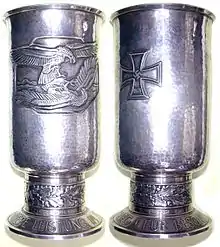 |
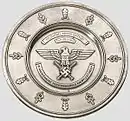 |
.jpg.webp) |
Foreign volunteer awards
| Blue Division Medal, Spain |
Medal for Gallantry and Merit for Members of the Eastern Peoples In various grades, with and without swords[12] |
Schalburg Cross, Denmark |
5th Don Cossack Regimental Cross[13][14] |
2nd Siberian Cossack Regimental Cross[15][14] |
|---|---|---|---|---|
_obv.jpg.webp) |
 |
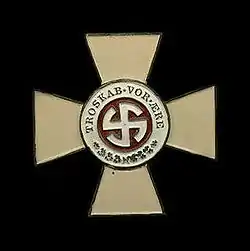 |
Order of precedence
Within the Wehrmacht, wartime awards (German: Kriegsorden) took precedence over peacetime decorations.[16]
- Grand Cross of the Iron Cross
- Knight's Cross of the Iron Cross with Oak Leaves (and higher)
- Golden Knights Cross of the War Merit Cross
- Knight's Cross of the Iron Cross
- Knights Cross of the War Merit Cross
- German Cross
- Honour Roll Clasp
- Führer Commendation Certificate
- Honor Goblet & Plate of the Luftwaffe
- Iron Cross 1st Class
- War Merit Cross 1st Class
- Iron Cross 2nd Class
- Combat Clasp
- Numbered war badges
- Wound Badge
- Tank Destruction Badge
- Unnumbered war badges
- Campaign shields & cuff titles
- War Merit Cross 2nd Class
- Ostvolk Decoration
- Eastern Front Medal
- War Merit Medal
- Cross of Honor (1914–1918)
- Spanish Cross
- Qualification badges
- Long-service awards
- Commemorative medals
- West Wall Medal
- Foreign decorations
See also
Notes
- ↑ One non-German received the Knight's Cross with oakleaves and swords: Admiral Yamamoto.[6]
- 1 2 3 While estimates vary, War Merit Crosses/Medals awards total 'some 13 million',[10] a figure reflected in total for all classes laid out here.
- ↑ The West Wall Medal was issued twice, once in 1939 and again in 1944. The 1944 version was commonly referred to as the "German Defense Medal". A "1944 bar" was authorized for recipients of the 1939 West Wall Medal.
References
- Citations
- ↑ "Dienstvorschriften Nr. 14/97. Bezug: Anzugordnung für die Soldaten der Bundeswehr. ZDv 37/10. (Juli 1996)". German Federal regulation. Retrieved 2019-09-06.
- ↑ "Bundesministerium der Justiz: Gesetz über Titel, Orden und Ehrenzeichen, 26.7.1957. Bundesgesetzblatt Teil III, Gliederungsnummer 1132-1". German Federal law. Retrieved 2019-09-06.
- ↑ Hieronymussen, Paul (1970). Orders, medals, and decorations of Britain and Europe in colour. London: Blandford Press. pp. 171–173. ISBN 978-0-7137-0445-7.
- ↑ Littlejohn & Dodkins 1968, p. 120.
- ↑ Littlejohn & Dodkins 1968, p. 117.
- ↑ Scherzer 2007, p. 801.
- ↑ Angolia 1987, p. 316.
- ↑ Both Littlejohn & Dodkins (p. 120) and Previtera (p. 322) indicate 'about 300,000'. Some estimates are higher.
- ↑ Previtera 2007, p. 322. Some estimates are lower.
- ↑ Littlejohn & Dodkins 1968, p. 129.
- ↑ Angolia 1987, p. 320.
- ↑ Kurt-Gerhard Klietmann: Auszeichnungen des Deutschen Reiches. 1936–1945. Motorbuch, Stuttgart 2002, ISBN 3-87943-689-4. p. 57-59
- ↑ Littlejohn & Dodkins 1968, p. 202.
- 1 2 Littlejohn 1994, p. 299.
- ↑ Littlejohn & Dodkins 1968, p. 203.
- ↑ Lumsden 2001, p. 88.
- Bibliography
- Angolia, John (1987). For Führer and Fatherland: Military Awards of the Third Reich. R. James Bender Publishing. ISBN 0912138149.
- Littlejohn, David; Dodkins, Colonel C. M. (1968). Orders, Decorations, Medals and Badges of the Third Reich. California: R. James Bender Publishing. ISBN 978-0854200801.
- Littlejohn, David (1994). Foreign Legions of the Third Reich. Volume 4. United States of America: R. James Publishing. ISBN 0-912138-36-X.
- Lumsden, Robin (2001). Medals and Decorations of Hitler's Germany. England: Airlife. ISBN 1-84037-178-1.
- Previtera, Stephen Thomas (2007). The Iron Time: A History of the Iron Cross. Second edition. Winidore Press. Richmond VA. ISBN 978-0967307039.
- Scherzer, Veit (2007). Die Ritterkreuzträger: 1939-1945 (in German). Scherzers Miltaer-Verlag, Jena, Germany. ISBN 978-3-938845-17-2.

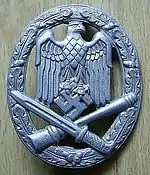
.jpg.webp)
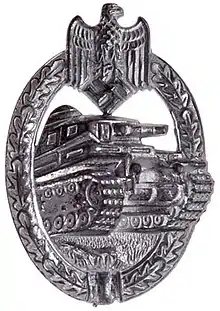

.png.webp)
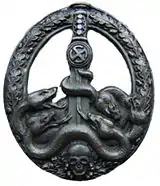
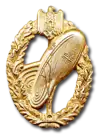

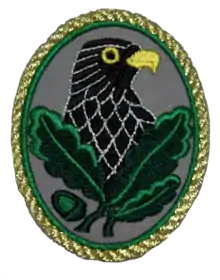
.jpg.webp)
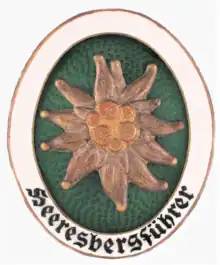
_Svolv%C3%A6r%252C_Norway_2019-05-08_DSC09822_(cropped).jpg.webp)
